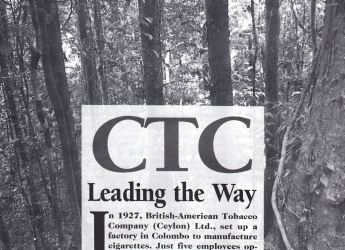
The Government of Sri Lanka signed an agreement on October 31, with Hanjung (Korea Heavy Industries & Construction Co. Ltd) to divest 90 percent of its stake in the Ceylon Steel Corporation Ltd., (CSCL) for US$15 million (Rs 840 million).
The remaining 10 percent will be gifted to CSCL’s employees currently with the company, depending on their years of service rather than on their ranks.
Under this agreement Hanjung. one of Asia’s leading industrial combines, will invest US8 10 million (Rs 560 million) on refurbishing, modernizing and expanding CSCL’s existing steel rotary mill, and will also take over CSCL’s existing 1326 strong workforce, thereby allaying fears of retrenchment.
Mr. Rajan Aseerwatham, Chairman, Public Enterprise Reform and Investment Commission (PERC), who announced the divesture at a media briefing on November 1, said that the government which is committed to providing employment has made specific provisions to ensure that all CSCL’s employees will not be considered redundant by Hanjung and that this applied to all privatisations. He said the conditions of purchase were very favourable to Sri Lanka and that this highly respected Korean combine which undertook infrastructure projects the world over was owned by the Korea Development Bank, Korea Electrical Power Co., and the Korea Exchange Bank – all majority government-owned organizations.
Among the reasons for this divesture are that CSCL, the country’s leading supplier of steel products to the local market, has not been economically viable for some time, though its records reflect profits mainly achieved by the 35 percent tariff barrier it enjoys. Once this barrier is lowered under the various agreements coming into force, CSCL will face the danger of not being in a position to compete with the emerging suppliers and importers of steel – a result of the open economy.

The plant installed at CSCL in 1967 is 29 years old (the normal life span being only 10 to 15 years), hence its inability to meet its production requirements. Also, the inability of the government to provide the necessary funds to develop CSCL or provide the relevant management techniques and technological resources all of which could be achieved better by a private enterprise, with international expertise technology and resources.
The investors who met President Chandrika Kumaratunga have indicated that within ten months of the takeover and refurbishment, they will be in a position to provide the country’s need of 20,000 metric tons (MT) of steel and much more for export. The CSCL produces only 4000 of this 20,000 MT.
This divesture is believed to have significant benefits for the general public, the construction industry, and other steel purchasers, the government of Sri Lanka, the national economy and more importantly the employees of CSCL.
As far as the public is concerned, they can expect to enjoy lower home building costs and more durable homes with the improved quality of construction steel. The construction industry will have a wider range of better quality products and at more competitive prices to choose from. The Government will utilize the money from the sale of this stake to Hanjung for its development work. The balance of payments will improve when imports of finished steel products drop, once CSCL’s production facilities are updated and expanded to meet the domestic demand and provide an export surplus. The CSCL employees can therefore expect better prospects, incentive, pay and working conditions besides becoming shareholders in the company.
This investment in Sri Lanka by a Korean company is regarded as investor confidence in the Lankan economy.
Hanjung is also considering several other investments including the construction of a mini mill, a 280 MW oil-fired power plant and an oil refinery.
Jae Hong Huh, Hanjung’s General Manager, Sales & Marketing who will be the General Manager once CSCL is taken over, said they were still in the process of submitting various proposals for approval but that initially, expatriate staff will be recruited to Lanka to train all categories of the local staff. Pro vision will also be made to take 30 employees periodically to Korea for training and even provide employment for those wishing to work in their numerous other projects abroad.
The mini mill will be constructed on CSCL’s 183-acre site at Athurugiriya where all its fixed assets are housed and which include a steel rolling mill set up in 1967, a steel wire mill also set up in 1967, a steel boundary built in 1975, and a melt-shop with a 25 metric ton are furnace for making mild steel billets from scrap which has been closed since 1985.
The mini mill once constructed will produce carbon mild steel in the form of round deformed bars for use by the construction industry and will have a production capacity of 300,000 metric tons per year far in excess of CSCL’s present capabilities. The 280MW generator plant will provide not only the required power for the mill but also feed the national grid with the excess.
It is expected that the demand for deformed steel bars will increase by 15 to 25 percent over the next few years and that the output of the mini mill will help meet this demand.
The remaining two-thirds of the mini mill’s output will be exported, enabling Sri Lanka to be among the steel-exporting nations serving the emerging markets of Africa and South Asia.



